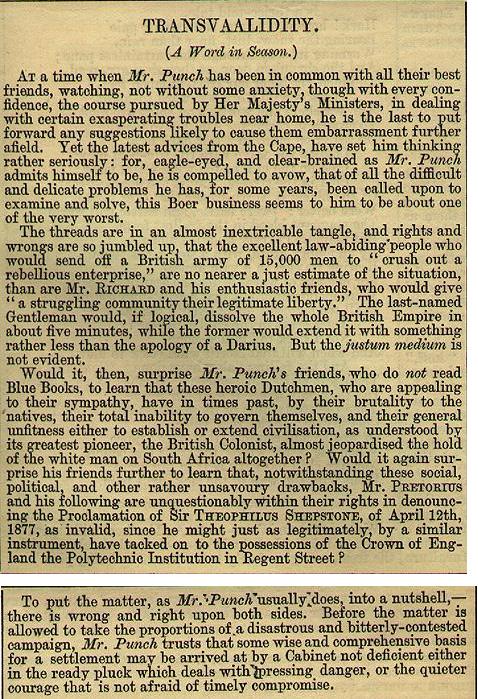Course:HIST317/Empire - Abroad/Alex Document Analysis
The article which appeared in Punch Magazine on the 29th of January 1881 entitled ‘Transvaalidity (A Word in Season)’ provides a valuable insight into the workings of the British empire-building process. The article deals with the moral questions arising from the first Boer War, which had broken out a little more than five weeks before the publication of this issue.

The tone of the article is neutral, which is interesting given the perception modern readers have with regard to the Victorian Imperialist ethos. Since the conclusion of the Crimean War in 1856 Punch had been growing progressively conservative in outlook, and in 1881 was under the new, even more conservative, editorship of F. C. Burnand. For a periodical of this conservative nature to be neutral about such an imperialistically-motivated war throws into doubt this entire assumption of ‘popular imperialism,’ and also the idea that the ruling classes or bodies were using imperialism to distract the populace from problems at home, an argument which is still widely accepted throughout the secondary education system of the western world. Perhaps the opposite might be truer. While the British electorate was distracted at home with the furore over Irish Home Rule, and Gladstone’s Midlothian campaign, the Disraeli government was relatively free to pursue the personal imperialist ambitions of its leaders.
This idea of an electorate distracted from foreign affairs by events at home is supported in the opening sentence of the article, which states that ‘Mr. Punch’ and all his friends have been: ‘...watching, not without some anxiety, though with every possible confidence, the course pursued by Her Majesty’s Ministers, in dealing with certain exasperating troubles near home.’ This phenomenon has a modern example in the American presidential election in 2004, where the Republican candidate can be argued to have won on his domestic policy, with relatively little media attention being paid within the United States to the international consequences of his election. This may only be true to a limited extent, in both the United States and in Victorian Britain, but the comparison does serve to illustrate that politics in Victorian Britain, just as in modern democracies, were by no means monolithic. It is a trap which historians often fall into when focusing on one aspect of a society, to ignore the wider range of issues confronting people at the time. For instance, while one historian might argue that the First World War came about because of inter-generational tensions within nineteenth-century European society, another might suggest that it was a culmination of the imperial rivalry between Great Britain and Imperial Germany. Both historians have valid arguments, and yet at the time the immediacy of one factor may well have been clouded by several other competing factors in the minds of the actors in these events. On the other hand, the article demonstrates certain attitudes and assumptions that are extremely exemplary of the stereotypical Victorian: ‘Would it, then, surprise Mr. Punch’s friends, who do not read Blue Books, to learn that these heroic Dutchmen, who are appealing to their sympathy, have in times past, by their brutality to the natives, their total inability to govern themselves, and their general unfitness either to establish or extend civilization, as understood by its greatest pioneer, the British Colonist, almost jeopardised the hold of the white man on South Africa altogether?’ By ‘Blue Books’ the author is referring to the annual reports of each crown colony and protectorate of the British Empire, which were published in a blue cover. In this excerpt we see evidence of several stereotypically Victorian attitudes. The idea of the civilizing mission is readily apparent, with Mr. Punch’s condemnation of the Boers for failing in this mission. Also apparent is the automatic assumption of the superiority of the ‘British Colonist,’ as well as a baser racism apparent in the reference to the white man’s control of South Africa, and also in the gross generalisations about the character of the Boer. Does this evidence of Victorianism contradict the earlier anti-monolithic thesis? Not necessarily. These sentiments can exist alongside others, even within this one article. The idea that Imperialism was largely carried out by the leaders of state with little support from the population is perhaps going too far, and yet if there is one overriding belief system apparent in this article it is an unflappable faith in the leaders of the nation. To take a wider view, Punch magazine was quite happy to criticize the individual actors in the affairs of state, and yet when it comes down to it, here is demonstrated an almost irrational faith in the ability of British institutions to arrive at a just and morally correct settlement.